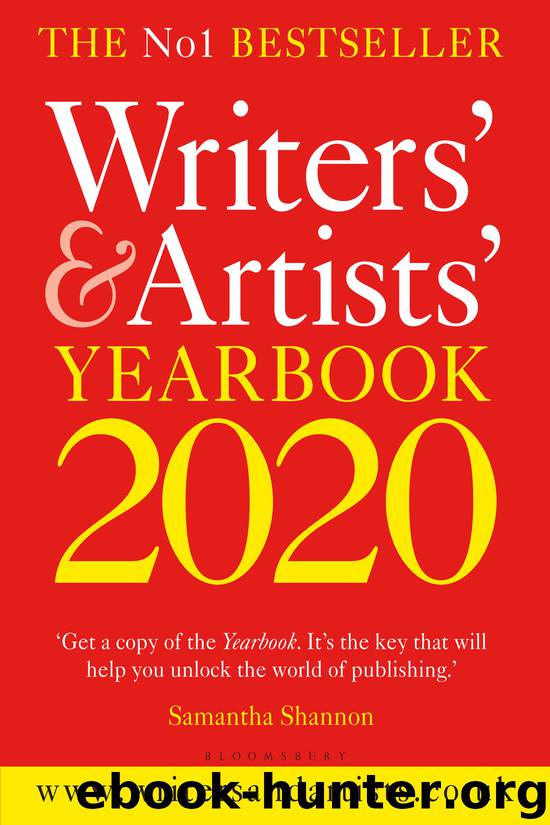Writers' & Artists' Yearbook 2020 by Bloomsbury Publishing

Author:Bloomsbury Publishing
Language: eng
Format: epub
Publisher: Bloomsbury Publishing
Theatre
Bringing new life to classic plays
What makes a successful, comfortably well off, academic publisher chuck in a safe career and try his hand in the slippery and financially unrewarding world of theatre? Mike Poulton describes how frustration with the style and tone of English productions of classic masterpieces in the past, and persistent neglect of such fine works, drove him to make his successful move into translation and adaptation. He shares his personal golden rules, practical advice and insights.
Becoming an adaptor of classic plays – the motivation
I suppose I became an adaptor of classic plays because, as an avid theatregoer since late childhood, I became increasingly unhappy with what I was seeing and hearing. I had read a lot of Schiller at university and become gripped by it. Why did these powerful epic dramas never, or very rarely, seem to make it into our theatres? Theatre back then was still a going concern, comparatively speaking, and every proud provincial capital supported its producing house. I had also read a lot of Chekhov. On the rare occasions I did see English productions of these Russian masterpieces, they seemed slow, unfunny – sometimes even turgid. Yet in the audiences for them there was an apparent reverence, which seemed unrelated to all the very English over-emoting that was projected woodenly from the acres of silver birch forest on the stage. It was sometimes possible to believe you had wandered out of a Cherry Orchard and ended up in Brief Encounter . My discontent grew and grew. The material was so much livelier – so much more thrilling in the imagination. I felt cheated. And later, with the arrogance of youth, I deluded myself into a belief that I could do better.
At a rare performance of a Chekhov or an Ibsen play it would seem clear to me that what the actors on the stage were saying, and how they said it, bore very little relationship to how people spoke in real life – either now or at the time the plays were written. It was as if the theatre had a style of delivery it reserved unto itself – as did, say, the Church and the BBC. What’s more, in a cast of 20 characters, each of them, whatever their status, spoke in the same way. Generals, postmasters and small children all used the same speech patterns and vocabulary – unless they were clowns (who always spoke Mummerset). But for the most part the cast delivered lines with a single voice, and it wasn’t difficult to work out that that voice must be the translator’s voice. I didn’t have the same problem with English writers; Shakespeare, though of a different age, seemed real and immediate. It was just that, with the Greeks, the Russians and the European greats performed in translation, there was a middleman, an often dry and academic voice, getting in the way. The immediacy and drive of the original was lost – buried under the literalness of the English text.
An
Download
This site does not store any files on its server. We only index and link to content provided by other sites. Please contact the content providers to delete copyright contents if any and email us, we'll remove relevant links or contents immediately.
Crazy Rich Asians by Kevin Kwan(9292)
Small Great Things by Jodi Picoult(7144)
Spare by Prince Harry The Duke of Sussex(5197)
Too Much and Not the Mood by Durga Chew-Bose(4348)
Machine Learning at Scale with H2O by Gregory Keys | David Whiting(4313)
Never by Ken Follett(3957)
Harry Potter 02 & The Chamber Of Secrets (Illustrated) by J.K. Rowling(3677)
I'll Give You the Sun by Jandy Nelson(3448)
Fairy Tale by Stephen King(3399)
The Ultimate Backcountry Survival Manual by Aram Von Benedikt; Editors of Outdoor Life;(3266)
Reminders of Him: A Novel by Colleen Hoover(3121)
The Man Who Died Twice by Richard Osman(3081)
Fantastic Beasts and Where to Find Them: Illustrated edition by J.K. Rowling & Newt Scamander(3027)
Will by Will Smith(2920)
The One Memory of Flora Banks by Emily Barr(2864)
Beautiful Disaster 01 by Jamie McGuire(2793)
Harry Potter and the Deathly Hallows (7) by J.K. Rowling(2726)
Never Lie: An addictive psychological thriller by Freida McFadden(2629)
Hooked: A Dark, Contemporary Romance (Never After Series) by Emily McIntire(2556)
